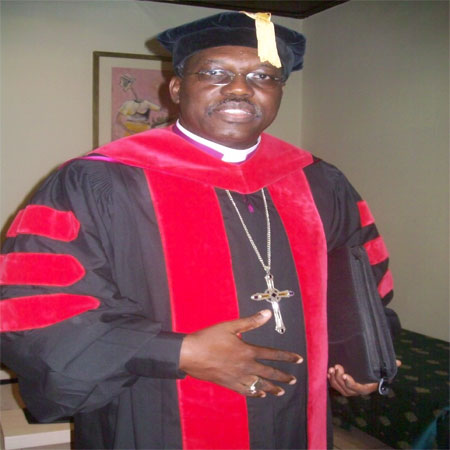
The Anglican Mission
Dear Reader,
In the words of St. Peter, the apostle of Jesus Christ,
In the words of St. Peter, the apostle of Jesus Christ,
In the words of St. Peter, the apostle of Jesus Christ,
In the words of St. Peter, the apostle of Jesus Christ,
In the words of St. Peter, the apostle of Jesus Christ,
In the words of St. Peter, the apostle of Jesus Christ,
"Praise be to God . who in his great mercy gave us new birth into a living hope by the resurrection of Jesus Christ from the dead!"
(1 Peter 1: 3)
At this time we are celebrating the Feast of the Resurrection, or Easter. Incidentally, we have not had Easter this early for Ninety five (95) years and the next time we are going to have Easter this early will be in Two Hundred and Twenty (220) years' time - 2228! Be that as it may, early or late, Easter continues to be celebrated joyously annually. This celebration recalls happenings that are at the heart of the Christian Faith - the time when Jesus rose from the dead. After the events of darkness and death on Good Friday, the light and life of Easter is truly something to celebrate. When we consider "life" in general, we tend to think of our own personal lives, the lives of our loved ones and the life of the world around us. Life and hope seem to go together. As the saying goes - "where there is life, there is hope".
In a world that seems to have much darkness in it, we may hear people question - where is this hope? We hear from our newspapers, radios and televisions that many people in our world do not have sufficient food to live on - let alone a nourishing diet to nurture body, mind and spirit. We hear of global warming and environmental degradation. What future do we have? I would like to present the case for hope; and further to state that, under God, the cause for hope can be in our hands.
First and foremost, God, revealed in the form of man (Jesus), opted for life. In order to conquer sin Jesus was prepared to undergo the most appalling pain - of body, mind and spirit. He was prepared to die - to die the death of a criminal - for us. Whatever we may suffer here on earth, we can be sure that God understands this, through His own experience, and is alongside us in our pain. The good news and hope we have to share is to be found in the events of the third day from Good Friday. On this day Jesus overcame death and rose from the dead. This is what we celebrate today - and what greater evidence can we have in the cause for "hope". This is what we celebrate today - the resurrection to life of Christ Jesus. In conquering death, Jesus obtained for us the chance of eternal life - in this world and in the world to come. This is the backbone of the Christian Faith.
Although God, in Christ, has won the war against sin and death, we too can participate with God in creating a better world to live in. A large proportion of the world's problems are due to the sin of greed and pride in humankind. So, it is logical to deduce that we can be part of the solution.
In the beginning God created the heaven and the earth and all that is in it. At that time, "God saw all that he had made, and it was very good" (Genesis 1: 31). The creation of man and woman was the pinnacle of God's creation, and for a while all continued well. However, when man and woman sought equality with God the downward spiral began. Adam and Eve represent God's creation of humankind in the beginning - a creation that was perfect, but which fell through sin. We are "re-created" through Jesus Christ, who, in the words of St. Paul, "did not think to snatch at equality with God" (Philippians 2: 7). The way we live our lives, under God, determines whether and how we continue to be re-created or re-generated, or whether we degenerate. Our actions can be "life giving" or "death dealing". Our actions can cause us to turn to God, or they can cause us to turn away from God. God is the great life giver. Jesus said, "I have come that man may have life, and may have it in all its fullness" (John 10: 10).
We have turned away from God and God's ways in the way we have misused our planet. We have lost our reverence for God's perfect creation. As we relate more and more to a material world, we lose our spiritual connection with the earth and with God. Our ancestors, and probably even our older generation today, maintained a kinship with the land. We are in danger of losing this - to our own detriment. The satisfaction we can attain through our connectedness with the land and our environment can so easily be lost, but is inevitably replaced by something else. In order to satisfy our deeper longings, we are in danger of developing other "addictions". These would most drastically be found in alcohol or drugs, but can also be found in other forms of materialism. As we strive to satisfy our inner longings by artificial means, we can so easily move away from God. We would also find that our relationships with our neighbours will suffer. The more we are caused to look in on ourselves; we more and more fail to notice the need in the person next to us. If we believe that our neighbour is made in the image of God, to look at them is to look at God, and to serve both. All major Faiths in our world advocate concern for our neighbour. Where have we gone wrong?
Let us return to the fundamental teaching of our Faith - to love God and our neighbour. Let us return to the basic moral teachings of our Faith, which is based on respect for God and respect for our neighbour. Let us re-own the principle of the "bantaba", where all views can be heard, and where we can maintain the art of gracious disagreement when opinions vary. Let us seek the truth and true justice for all. When one of our brothers or sisters falls from grace, may there still be the due process of justice, but with mercy. In the words of the prophet Micah, "And what does the Lord require of you? To act justly and to love mercy and to walk humbly with your God." (Micah: 6: 8)
What, then, is our cause for hope? It is our knowledge of a loving God who would take the form of a man and die for us, but then rise to new life. It is our knowledge that, by this intervention by God, sin and death have been overcome. It is our knowledge that, by God's grace, we can be empowered to work with God for a better world of justice and peace. This truly is good news.
It is my ardent prayer that God's gifts of peace with justice may come to our world and our lives. May you and yours know God's peace this Eastertide, and always.
Happy Easter!
Your Friend and Bishop,
+Tilewa
Read Other Articles In Article (Archive)
Gambia commemorates World Press Freedom Day
May 5, 2011, 2:30 PM
Italian National remanded on rape charge
Sep 21, 2011, 1:09 PM



